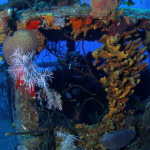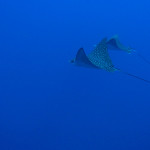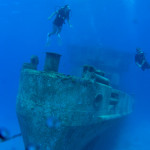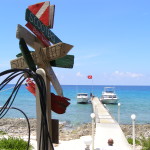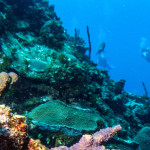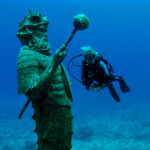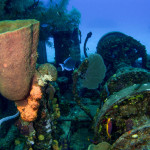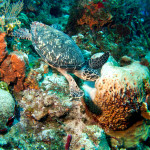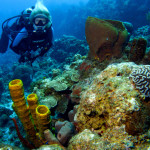On my first visit to the Cayman Islands, I thought I’d died and gone to diving heaven. But in the 10 years since, a lot of water had flowed past my fins. Last summer, I got a chance to revisit one of my first loves, Grand Cayman, and see if the reefs held up to my enduring memories. Luckily, they did. After a glorious week there, here’s my short list of the best dive sites in Grand Cayman.
Most of Grand Cayman’s topside action takes place on the West End, a busy strip of hotels, restaurants, bars and cruise-ship passengers. But, so far, the development hasn’t seemed to affect most dive sites, although that may change with the construction of a new cruise-ship dock. Here are three of the area’s best.
Dolphin Drop Off
This site features a series of finger reefs that lead out to a wall, which maxes out at about 90 feet (28 m). I never saw the wall — instead I spent almost the whole dive drifting among the very healthy coral fingers, getting to know a turtle, one that was so tame it allowed us to stay within a few feet as it went about its daily routine. And this wasn’t last time we were granted such up-close access, either — large animals seemed to be curiously tame at most sites. I took the chance to snap away with my camera, and when I finally I checked my pressure gauge, it was time to head back to the boat.
Eden Rock North
This shallow reef, about 45 feet (14 m) deep, is often visited by snorkelers from the cruise ships that sit like massive spaceships only about 1,000 feet away. Although it’s still a relatively healthy reef, the real attraction here is the abundance of swim-throughs and the resident population of massive tarpon, which were also indifferent to my approach. Coral canyons offer the perfect perch for divers who want to snap up-close pictures of these lovely fish.
The Kittiwake
Purpose sunk as an artificial reef in 2011, the Kittiwake is a 251-foot-long (76.5 m) former submarine support ship. Since then, Kittiwake has settled into the sand in about 70 feet (21 m) of water, and is starting to have a nice coral-encrusted look. Divers here should take a good flashlight to explore inside the ship, which has been set up for safe penetrations. There are plenty of opportunities to exit if you’re a bit nervous about overhead environments, and the ship offers deck after deck for exploration. Check around the stern for a number of resident groupers and angelfish. They can be a bit skittish, but if you’re patient, they should make an appearance. The Kittiwake truly takes several dives for thorough exploration.
For me, the jewel in the crown of Grand Cayman diving is the North Wall, which makes up the edge of the Cayman Trench (or Trough) that runs from Cuba across to Central America. The trench reaches depths of 25,000 feet, and of course that kind of deep water usually means one thing — big pelagics. The North Wall doesn’t disappoint.
Black Forest
At about 100 feet (30 m), this deep wall dive is best for experienced divers. We dropped down and looked over the edge into a blue abyss as intense as outer space. The wall is covered in brightly colored, large fan corals and barrel sponges, and from the moment we arrived on the site, pairs of eagle rays seemed to glide by regularly as if on a scheduled transit line. So many appeared — I lost count at nine — that we finally started to look around to see what else the wall had to offer, which frankly made me a little nervous. I couldn’t help but think there’s a special place in diver hell for anyone taking this kind of wildlife encounter for granted.
Princess Penny’s Pinnacles
Once again we dropped down to the start of the wall at about 97 feet (29 meters). As we were swimming through a crevice to get out to the face of the wall, a large reef shark cruised by, checking us out. Delighted, we watched as it lazily circled us and then, with a show of complete indifference, made its way along the reef and slowly disappeared into the blue. Just below, we spotted another, smaller shark, and another turned up to check us out before we finally ran out of bottom time.
Although the northwest corner of Grand Cayman is less-visited, I’d been told the diving was great up there. When I went to have a look, I ended up liking it so much that I’ve added the area to my must-dives when in Cayman.
Lighthouse Point
This was my only shore dive on Grand Cayman and it was magical. It’s a great site for a scooter — my first use — and in no time we were flying through a series of coral canyons. Another must-see at Lighthouse Point is the massive bronze statue, The Guardian of the Reef, created by artist Simon Morris. Placed in about 65 feet (20 m) of water in 2014, it makes for an inspiring stop.
Although the East End of the island also holds many worthy sites, we unfortunately were not able to make it a part of the visit that resulted in this story — please feel free to add your favorites to our growing list of loves in Grand Cayman.
One final note, Grand Cayman is well equipped to serve the technical diving crowd. Dive shops in the northwest corner have all the needed gas mixes and extra equipment, as well as easy access to the North Wall. Regardless of your experience level, Grand Cayman offers endless variety.
The post The Best Dive Sites in Grand Cayman appeared first on Scuba Diver Life.
